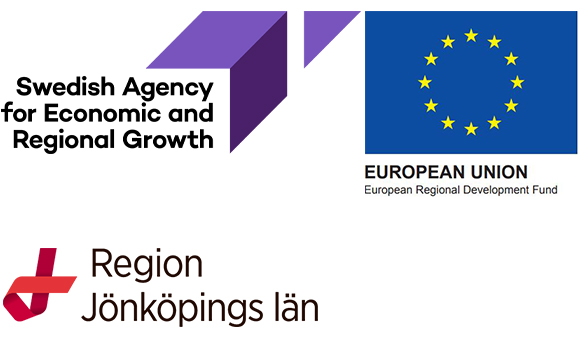Research at the School of Engineering will strengthen the county's e-commerce

E-commerce is the fastest growing retail sales channel and the School of Engineering at Jönköping University is now proceeding with a study at the regional level to strengthen e-commerce for manufacturing small and medium-sized enterprises (SME’s).
More than half of the manufacturing companies in Sweden sell their products online directly to the end customer, according to a study carried out by the School of Engineering (JTH) at Jönköping University (JU). JTH is now proceeding with a study at the regional level to strengthen e-commerce for manufacturing small and medium-sized enterprises (SME’s) in Jönköping County.

Andreas Risberg, researcher in Logistics at the School of Engineering, Jönköping University.
E-commerce is the fastest growing retail sales channel with an annual growth of 15 percent from 2006 to 2019, 40 percent in 2020 and 20 percent in 2021 respectively. All the retail sectors within consumer durables have already reached the threshold where all future growth is likely to occur online. Today, e-commerce represents 16 percent of the total retail sales and a quarter of the 82 Swedish manufacturing companies participating in the earlier study believe that e-commerce is of strategic importance for them.
A clear trend
“What happens when e-commerce accounts for a larger shares of sales is that there are fewer retailers, the retailers become larger and the total number of stores decreases. A clear international trend is for manufacturing companies to sell directly to consumers online to strengthen their competitiveness. One example is that Adidas aims for half of their global sales to be carried out directly to the end customer by 2025,” says Andreas Risberg, researcher in Logistics at JTH.
The study shows that the Swedish manufacturing companies have experienced strong growth in their e-commerce over the past five years and that many of them have high expectations for steady development. JTH is now pursuing a study at the level to assess the potential of e-commerce for manufacturing SME’s.
Good e-commerce potential
“In most cases, large manufacturing companies have come further on their e-commerce journey than small and medium-sized companies, but there is still good e-commerce potential even among small and medium-sized manufacturing companies and one of the a goals is that also they should be able to see the possibilities with this type of e-commerce. The idea is that the study should lead to a three-year project with the goal of strengthening the manufacturing companies' long-term competitiveness through e-commerce directly to the end customer, says Andreas Risberg.
Strengthen firms’ competitiveness
The study at the regional level will identify opportunities and challenges that e-commerce presents for manufacturing SME’s in Jönköping County regarding three key areas of sales, logistics and sustainability. The research seeks to identify sectors within manufacturing SME’s with highest potential in direct-to-consumer e-commerse. As part of the study the research team from the Department of Supply Chain and Operations Management (SCOM) at JTH will interview ten manufacturing SME’s in Jönköping County.
Facts
The study, which is project-led by Hamid Jafari, Assistant Professor logistics, at JTH, is called Manufacturer to Consumer e-Commerce and is co-financed by the Swedish Agency for Growth, Regional Development within the region Jönköping County and the School of Engineering at Jönköping University. The research team also includes other researchers from SCOM including Professor Joakim Wikner.

- Research Fellow Operations and Supply Chain Management
- School of Engineering
- andreas.risberg@ju.se
- +46 36-550 2443

